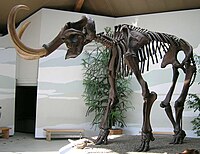
Photo from wikipedia
The objectives of the study were: (a) to study the effect of Haemonchus spp. on the growth performance characteristics of fattening calves, (b) to assess any potential effects on carcass… Click to show full abstract
The objectives of the study were: (a) to study the effect of Haemonchus spp. on the growth performance characteristics of fattening calves, (b) to assess any potential effects on carcass characteristics and (c) to investigate the potential role of climatic conditions in the process of the infection. The study was conducted for 201 days in an intensively managed cross-Limousin herd. The animals were divided into two equal groups: those receiving anthelmintic treatment (AT) and the untreated (C) controls. The same nutritional regime was applied to both groups and the feed consumption was calculated daily. Standard parasitological examinations were performed at weekly intervals. At slaughter, carcasses were weighed and assessed for conformation and fat cover classes. Climatic variables were obtained for the location of the farm and a temperature-humidity index was calculated. Before anthelmintic treatment with ivermectin, there was no difference in parasitic burdens between the two groups: 544 (AT) vs. 554 (C) epg, whilst after it, counts were 0 and 450–700 epg, respectively, with over 96% of larvae identified as Haemonchus spp. and, later, confirmed as Haemonchus contortus. It was concluded that treated animals had a higher average total bodyweight gain, higher feed conversion ratio and carcass yield of superior quality than controls. There was a difference between the two groups in the pattern of reduction of dry matter intake as the temperature-humidity index increased.
Journal Title: Pathogens
Year Published: 2022
Link to full text (if available)
Share on Social Media: Sign Up to like & get
recommendations!